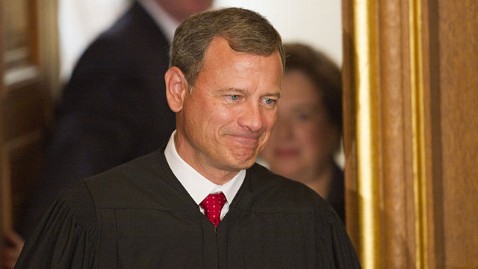Chief Justice Roberts Responds to Ethics Critics

PAUL J. RICHARDS/AFP/Getty Images
Chief Justice John Roberts issued a ringing endorsement Saturday night of his colleagues' ability to determine when they should step down from a case because of a conflict of interest.
"I have complete confidence in the capability of my colleagues to determine when recusal is warranted. " Roberts wrote in his annual report on the Federal Judiciary. "They are jurists of exceptional integrity and experience whose character and fitness have been examined through a rigorous appointment and confirmation process."
Roberts took the unusual step of devoting the majority of his annual report to the issue of judicial ethics, noting that he wanted to address issues that had "recently drawn public attention."
In the past several months members of Congress and public interest groups on both sides of the ideological spectrum have demanded that Justices - with potentially opposing views-recuse themselves from hearing the blockbuster health care case at the end of March.
Conservatives have focused on Justice Elena Kagan, arguing that her previous job of Solicitor General in the Obama administration should disqualify her from hearing the challenge to the law. During her confirmation hearings Kagan testified, under oath, that she had not played a substantial role in the case. Liberal groups have targeted Justice Clarence Thomas because of his wife's ties to a group opposing the health care law.
Recusal issues are left up to the individual Justice, and neither Thomas nor Kagan has indicated that they will not participate fully in the case.
In his report, Roberts says he cannot comment on any ongoing debates about particular issues , but that he wants to provide "clarification" on how Justices address ethical issues and "dispel some common misconceptions."
Roberts begins with the Judicial Conference created by Congress in 1922 as a policy-making body for the lower federal courts. The Judicial Conference adopted a Code of Judicial Conduct to provide guidance to federal judges, but it is only binding on lower court judges.
"Some observes have recently questioned whether the Judicial Conference's Code of Conduct for the United States Judges should apply to Supreme Court Justices as well." Roberts writes. He says that it should not.
"Article III of the Constitution creates only one court, the Supreme Court of the United States, but it empowers Congress to establish additional lower federal courts that the Framers knew the country would need."
As such, he says the Judicial Conference Code applies only to the lower courts Congress has created. But Roberts stressed that all the members of the Supreme Court do consult the Code of Conduct to asses their ethical obligations.
Roberts says the justices also turn to judicial opinions, treatises, scholarly articles and disciplinary decisions when deciding whether to step down from a case or controversy.
Justices are bound by a federal statute that says a judge should disqualify herself in any proceeding in which her impartiality might reasonably be questioned.
Roberts says that while Supreme Court Justices follow the same general principles respecting recusal as other federal judges, "the application of those principles can differ due to the unique circumstances of the Supreme Court."
Unlike a lower court judge, a Supreme Court Justice cannot be replaced if she steps down from a case.
"A Justice accordingly cannot withdraw from a case as a matter of convenience or simply to avoid controversy. Rather, each Justice has an obligation to the Court to be sure of the need to recuse before deciding to withdraw from a case. "
Justices are also required to file financial disclosure reports similar to all other federal judges. These reports disclose the Justices' non-governmental income, investments, liabilities, gifts and reimbursements from third parties.
Robert's reports comes at a time the court is under intense scrutiny by some presidential candidates, and before it hears several hot button cases-health care, immigration, voter's rights-that will be decided in the heart of the next election campaign.
"[A]t the end of the day," Roberts writes, "no compilation of ethical rules can guarantee integrity. Judges must exercise both constant vigilance and good judgment to fulfill the obligations they have all taken since the beginning of the Republic."